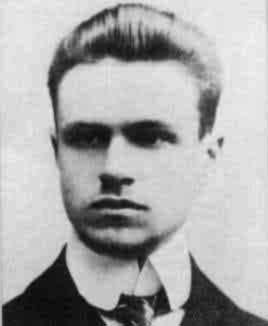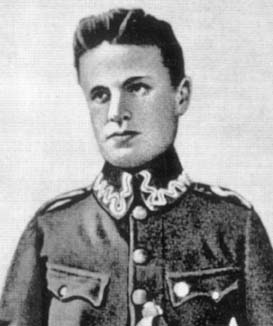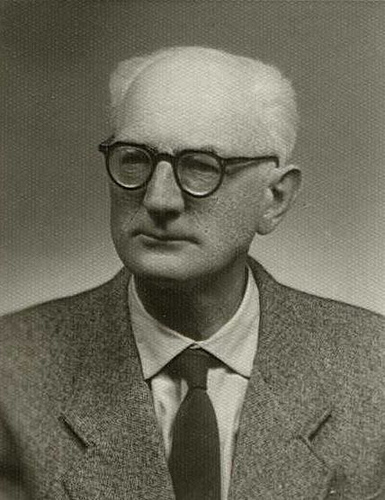<Back to Index>
- Mathematician Vladimir Igorevich Arnold, 1937
- Composer Alexandre Tansman, 1897
- Mathematician and Social Activist Zygmunt Janiszewski, 1888
PAGE SPONSOR


Zygmunt Janiszewski (June 12, 1888 – January 3, 1920) was a Polish mathematician.
His mother was Julia Szulc - Chojnicka. His father, Czeslaw Janiszewski, was a graduate of the University of Warsaw and was an important person in finance, being the director of the Société du Crédit Municipal in Warsaw.
Janiszewski taught at the University of Lwów and was professor at the University of Warsaw. At the outbreak of World War I he was a soldier in the Polish Legions of Józef Piłsudski, fighting for Polish independence. With Piłsudski himself and other officers, he refused to swear an oath of allegiance to the Austrian government. He left the Legions and hid under the false name Zygmunt Wicherkiewicz in Boiska, near Zwoleń. From Boiska he moved on to Ewin, near Włoszczowa, where he directed a shelter for homeless children.
At the end of World War I, Janiszewski was the driving force behind the creation of one of the strongest schools of mathematics in the world. This is all the more remarkable, given Poland's difficult situaltion at war's end. Janiszewski devoted the family property that he had inherited from his father to charity and education. He also donated all the prize money that he received from mathematical awards and competitions to the education and development of young Polish students.
In mathematics, his main interest was topology. He was the driving force, together with Wacław Sierpiński and Stefan Mazurkiewicz, behind the founding of the mathematics journal Fundamenta Mathematicae. Janiszewski proposed the name of the journal in 1919, though the first issue was published in 1920, after his death. It was his intent that the first issue comprise solely contributions by Polish mathematicians. It was Janiszewski's vision that Poland become a world leader in the field of mathematics — which she did in the interbellum.
His life was cut short by the influenza pandemic of 1918 - 19, which took his life at Lwów on 3 January 1920 at the age of 31. He willed his body for medical research, and his cranium for craniological study, desiring to be "useful after his death".
Samuel Dickstein wrote a commemorative address after Janiszewski's death, honoring his humility, kindness and dedication to his work:
Enthusiasm and strong will characterized Janiszewski not only in his scientific work, but in his life generally. His active participation in the Legions, his refusal to take an oath which was not compatible with his patriotic conscience, his work in the field of education, when at a most difficult time he entered that field as an enlightened and wise worker, free of any prejudice and partiality and ardently keen only to propagate light and truth - these facts prove that in the heart of a mathematicians seemingly detached from active life there glowed the purest emotions of affection and self - denial. If we also mention that, having very moderate needs himself, he dispensed all the means at his disposal to educate young talents, and that he bequeathed the property that he had inherited from his parents for educational purposes, and in particular for the education of outstanding individuals, then we may indeed exclaim from the bottom of our hearts that the memory of that life, devoted to the cause and interrupted so early, lives on in its results and deeds and will remain treasured and living for us, the witnesses of his work, and for generations to come.
While Janiszewski best remembered for his many contributions to topological mathematics in the early 20th century, for the founding of Fundamenta Mathematicae, and for his enthusiasm for teaching young minds, his loyalty to his homeland during the Great War perhaps
gives the greatest insight into his psyche. The orphans' shelter that
he set up during the war doubtlessly saved many lives, and is perhaps
his greatest contribution to the world. His premature death, while a great loss to mathematics, was also an immense loss generally to society and to the world.
